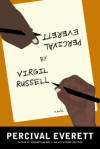Percival Everett by Virgil Russell
Percival Everett’s narrative model is vacillating like our thoughts, changeable as our awareness that inhabits the present as we are ever forced to find meaning by telling ourselves what is in front of us. Upfront in Percival Everett by Virgil Russell, Everett constructs the perch from which the book is written: “language was a great failure or deceiver . . . that it could not be trusted” because the Ontological Argument for God’s existence was logically, but not factually, sound. “A=A,” a logical proposition, is not the same as “A is A,” pointing at existence. Once we are in the territory of “is,” the otherness of life as its own force enters, and with the acknowledged unreliability of language comes a different kind of narrative than the narrative forms we have acclimated to in the modern era. All the techniques of postmodern narrative, a merged narrator of at least seven voices, intertextuality using literature elements from more than two thousand years, the narrative looking at the narrative as it is being written, nonlinear time, mix of high and low subjects, and varied writing styles are used to give us a story pointing beyond language . . . and Everett does accomplish this. The postmodern techniques, as deranging as they are, take a backseat to the “heart of the matter.” Yet the techniques let us experience our struggle for the incomprehensible knot it is.
Percival Everett’s narrative model is vacillating like our thoughts, changeable as our awareness that inhabits the present as we are ever forced to find meaning by telling ourselves what is in front of us. Upfront in Percival Everett by Virgil Russell, Everett constructs the perch from which the book is written: “language was a great failure or deceiver . . . that it could not be trusted” because the Ontological Argument for God’s existence was logically, but not factually, sound. “A=A,” a logical proposition, is not the same as “A is A,” pointing at existence. Once we are in the territory of “is,” the otherness of life as its own force enters, and with the acknowledged unreliability of language comes a different kind of narrative than the narrative forms we have acclimated to in the modern era. All the techniques of postmodern narrative, a merged narrator of at least seven voices, intertextuality using literature elements from more than two thousand years, the narrative looking at the narrative as it is being written, nonlinear time, mix of high and low subjects, and varied writing styles are used to give us a story pointing beyond language . . . and Everett does accomplish this. The postmodern techniques, as deranging as they are, take a backseat to the “heart of the matter.” Yet the techniques let us experience our struggle for the incomprehensible knot it is.
The primary narrator is a merging of father, son, grandfather, Murphy, Gregory Lang, Murphy Lang, Nat Turner, and Billy (Virgil), with descriptive elements of each of their stories interjected into the others’: “Your old man posing as you in a voice that is at once yours and at once mine and at once neither.” The survival-pressed, vulnerable egos of these narrators reflect the struggle to be human. In their reaction of cynicism, saturated with sadness, they ask the question many times in one way or another, Does it matter? Why do anything? They ask if there is meaning, purpose, and eviscerate meaning of themselves by referring to their so-called life and what we choose to call the world. The hydra-headed narrator is amorphously hovering but with a tangible grip. The narrators are believable as one voice. And Virgil, writing at the time Rome became an Empire, akin to the American Empire, had an underlying sad pessimism, yet he worked at writing the Aeneid for eleven years. And Bertrand Russell wanted to ground mathematics in logic. Language is what we use to know where we are standing in life’s onrush, even if but for a moment. For Everett:
. . . language remains always a step ahead of us . . . all we ever do is circle where we think language might reside, guessing like we guess about the location of electrons, about positrons and pions and muons and kaons and leptons and quarks and imaginary ducks, using it without pause, without thought, knowing that we cannot live without it, that we define ourselves with it and by it, but it is not ours . . .
The fraternal twins, language and existence, aren’t the same. Per Everett, this could have or have not happened in this way specifically in this story, but did at many points in America’s history, as we are told the stories of the black father and son. When the father was lynched by the Klan, the son says: “I could see my father’s expressionless face telling me to run. . . . They put the rope in a tree, a tree that sank its roots deep into everywhere, deep into yesterday, deep into my blood and theirs.” This son, now in a nursing home, makes friends with Billy. The orderlies do a bullying shakedown of Billy’s room, and Billy hears the one photo he had of his dead daughter break onto the floor. At ninety, he falls as he runs to save it and dies from the fall. Six of the residents decide to rebel and take revenge for Billy’s life; “What will that do for us? It might satisfy us.” And the son, when he is thirteen, of “this” father and his white mother, listens on the stairs as he witnesses the chaotic, hard core of his parents’ marriage . . . that is about power and love and not being loved . . . and if the father “is” loved by his mother who just had an affair that was her own cry of not feeling loved.
We crash into existence at the edge of our humanness and it is unquantifiable and unknowable and we are left dangling with nothing resolved. Everett does not let the reader escape in a story that has an arc of resolution. He steps us down into the dark pull of meaning—and, “is” there any . . . and the questioning brings cold-stop anguish. Not only is the novel format ripped open by removing the accustomed modern-era literary techniques, but a narrative model is made dealing with language itself that is unreliable and what we are left with is “knowing” by way of the human heart . . . as he says several times, “I do not want to know the human heart.” Yet he cannot escape the “maps of our plans and stretched all things to their limits the budding disleafing and felling of trees . . . forced me into that perplexing jungle that deep root-riddled tangle of wilderness that was myself.” The human struggle matters as much as we question the language that describes the struggle: “Things are not as elementary as they seem.” The six forming their rebellion in their eighties and nineties, the same blind sword to push forward as youth, because of the needless cruelty resulting in Billy’s death, their humanity aroused: “The fact that Billy was so old did not, would not, cause us to mourn his death any less . . .” Here is the “heart of the matter.”





